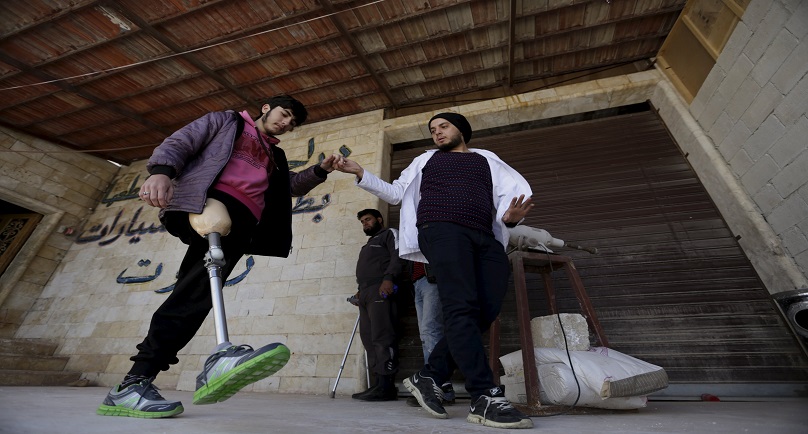Image: Khamis (R), 24, helps a man with an amputated leg walk using an artificial limb in the rebel-controlled area of Maaret al-Numan town in Idlib province, Syria March 20, 2016. REUTERS/Khalil Ashawi
By Khalil Ashawi
Maaret al-Numan, SYRIA (Reuters) – In what looks like an ordinary white truck, two men are helping victims who have lost limbs in the conflict in Syria to walk, play, and even herd sheep again.
In the past four years, the two technicians have made and fitted about 5,000 prosthetic limbs for an estimated 2,500 people. Their mobile clinic has been running for about six months, and has gone some way to improve access.
The five-year war between the government of President Bashar al-Assad and insurgents has killed at least 250,000 people and wounded many more.
While most of the wounded are between 15 and 45, the clinic also fits children and the elderly with replacement limbs.
“The feeling can’t be described when you put the new prosthesis on a patient, especially kids,” says technician Amjad Hajj Khamis. “They love to move and play so it’s a wonderful feeling to help a child to walk again.”
Khamis, 24, was studying French literature at the University of Homs, and his colleague Abdalrahim Khlouf, 25, was training to be a school teacher. Both had to give up after just four months because of the worsening situation in the city.
Starting work in a field hospital, the men were trained how to make and fit artificial limbs, including a stint in the Turkish border city of Rihaniyya and distance learning from Pakistan, Britain and Germany.
Patients come from opposition-held areas including the northwestern province of Idlib, the Douma neighborhood of Damascus and the northern city of Aleppo, which was Syria’s biggest city until the conflict erupted in 2011.
Demand from amputees far outstrips the services the clinic is able to provide. In each location the mobile clinic visits, keeping patients safe from bombing is a recurrent problem, Khamis says. The U.N. estimates there are a total 4.6 million people in Syria who are hard to reach with aid.
Among those who have benefited from the traveling prosthesis clinic is a 9-year-old girl who stepped on a landmine when walking through a field to visit her grandfather.
“I woke up at the hospital and didn’t find my foot, it must have proceeded me to heaven,” says Salma.
“In the beginning I was depressed, but when my dad told me I was going to get a prosthesis and walk again, I was very happy.”
Qusay, 14, lost his foot and his right arm when he and his twin brother Adi found a landmine while herding sheep in February 2015. His brother dropped the mine and died immediately from the blast. Qusay still has shrapnel lodged close to the brain.
Thanks to his prosthetic limbs, Qusay, who comes from the town of Abu Maki in Idlib province, has regained some of his former independence.
“I always go out to play or herd the sheep,” he says. “I don’t like sitting at home.”
(Reporting by Khalil Ashawi; Writing by Brian McGee; Editing by Raissa Kasolowsky)
Copyright 2015 Thomson Reuters. Click for Restrictions.


